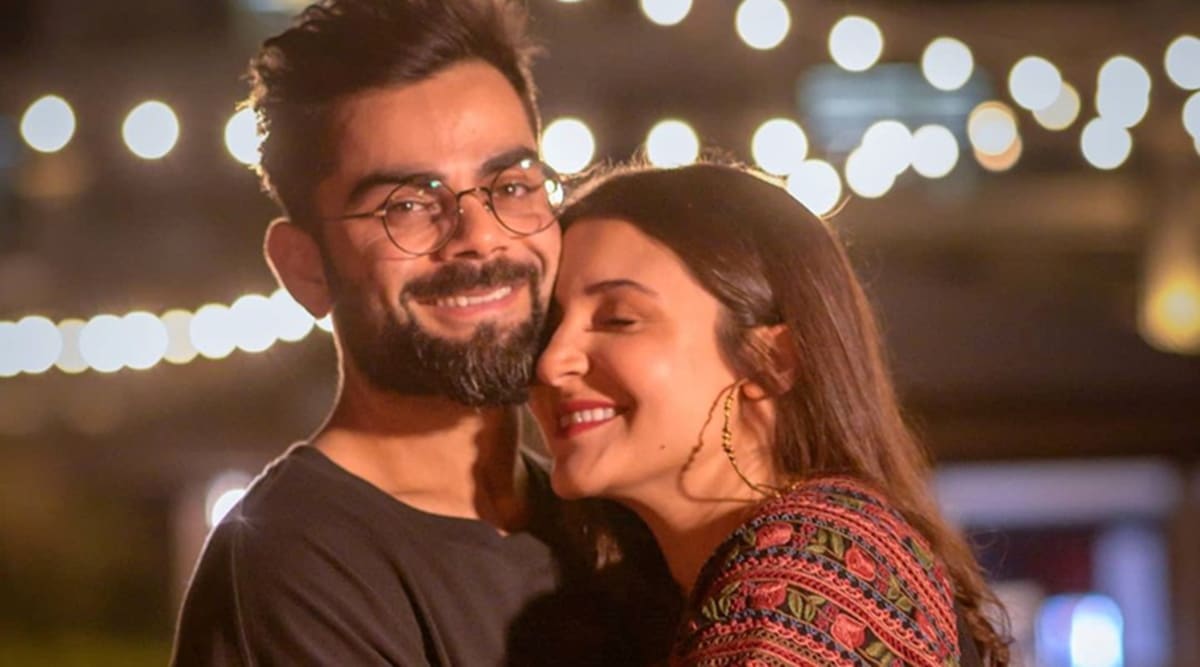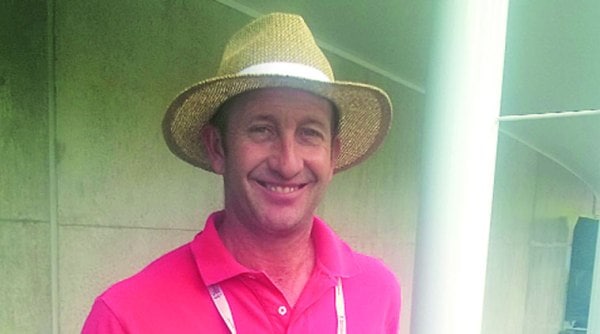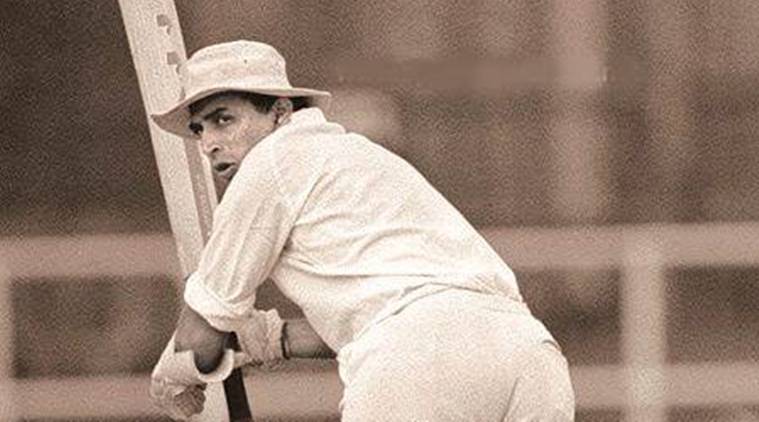 Anushka Sharma on Friday shared pictures from Virat Kohli's birthday celebrations. (Photo: Anushka Sharma/ Instagram)
Anushka Sharma on Friday shared pictures from Virat Kohli's birthday celebrations. (Photo: Anushka Sharma/ Instagram)Allan Border was battling for a draw when news of his daughter’s birth flashed on the screen behind him. Elsewhere, the otherwise cool Sunil Gavaskar seethed at a barrage of beamers from the West Indians who had packed off five Indians to the hospital, hoping to stay alive to head back home and see his new-born son.
But earlier this year, Joe Root skipped Tests against West Indies, and now Virat Kohli is slated to return from Australia, to be around for the birth of their first child. The Indian Express looks back at a time when paternity leaves were frowned upon, cricket boards weren’t as accommodating, phone lines were highly unreliable and travel far too inconvenient to allow male players to be around for childbirth.
Umpire’s call
Chris Harris was at a cricket ground in England when his wife went into labour in New Zealand. “I gave my phone to the umpire, requested him to alert me when I get a call as my wife was expecting twins, and has entered labour,” Harris, a former New Zealand all-rounder, told this newspaper in 2015. The phone rang, Harris learnt that twins had popped out and the younger, son Louie who was pushed out second, breathed first. And that the daughter Phoebe cried out only after three-four minutes. “There was a slight discrepancy in Phoebe’s left and right sides – she had hemiplegia which causes problems in movement and coordination.”
 Former NZ player Chris Harris.
Former NZ player Chris Harris.
Harris’ wife Linda, who had to spend seven weeks on the hospital bed after Phoebe’s birth and him, are learning to still deal with it though luckily, it has got progressively better. “At that moment on the cricket field, I was thinking how quickly to get on a plane and get home.”
Rising from the Ashes
Former England captain was swearing and cursing in the dressing room in 1993 after a loss to Australia when he was told that his mother was on the telephone line. “The dressing room attendant said it was for me, and the words I uttered were not what you’d want to use in front of your mum. Anyway, it was my mum,” Steward told BBC in July this year. “She said, ‘Lynn has been in labour for four hours, if you want to try to get here’. I left Edgbaston pretty much straightaway, and got there five minutes after Andrew arrived into the world.”

Two days later, Stewart returned to play the next game against Australia, scoring 74. “Back then, you didn’t think about missing a game. If I had my time again, I’d be doing exactly what Joe Root has done (took a Test off when his child was born this June). We just didn’t know any different. Lynn and I have been married since 1991. In that time, we’ve only had one summer holiday.”
Sound of babble, not beamers
Different times, different codes. Gavaskar was in New Zealand for a series when he heard about the birth of his son Rohan in 1976. He wanted to come to India to see him as India’s next cricketing engagement was in the West Indies after two weeks. But the BCCI didn’t grant him permission and asked him to fly with the rest of the team to the Caribbean. Gavaskar would see his son only after two-and-a-half months, and the frustration would blow up in the infamous Jamaica Test when the West Indies hurled bouncers and occasional beamers, sending five Indians to hospital.

Anshuman Gaekwad, Gavaskar’s opening partner, remembers a brave 131-run partnership when the situation came to a boil after Gavaskar complained to the umpire about intimidatory beamers, but was instead mocked. “The umpire said we were not used to playing short balls and Gavaskar was very angry. I requested him to calm down because I had seen him angry for the first time and he told me, ‘I don’t want to die here. I want to go home and see my son’,” Gaekwad wrote in a column in Daily Guardian.
Big screen lights up
Gavaskar’s contemporary Border (in pic) was batting in a Test against India, trying to save the game, when the big screen flashed the news of the birth of his daughter. “Congratulations on the birth of your daughter Nicole. Born this afternoon.” Border was playing in the West Indies when his first child was born, whom he saw after two weeks but was present for the birth of the next two kids.
Nation before daughter
MS Dhoni was in Australia for the tour that preceded the 2015 World Cup when his daughter was born and his wife conveyed the news of the birth to him through a text message to Suresh Raina as Dhoni was typically incommunicado. Asked next day by the press whether he would like to be with his family, Dhoni said. “Not really … as of now am on national duties so I think everything else can wait. The World Cup is a very important campaign.”
Stuck in South Africa
Sourav Ganguly was captaining India in a Test series in South Africa in 2001 when his daughter Sana was born. He would see her after a month and years later, his wife Dona would tell IANS, “The news of the birth of our baby reached Sourav before me. Owing to the surgery, I was unconscious for a few hours.”
Break for Brooke
Shane Warne was watching the rain wash away a practice game against British Universities in Oxford during the 1997 Ashes tour when he became a father for the first time. But he had to wait for nearly a fortnight before he could see his daughter Brooke. Australia were down 1-0 in the series, and they could ill-afford to lose their match-winner. Warne helped Australia square the series by grabbing nine wickets at Old Trafford, his favourite venue, before flying home for a week and returning in time for the fourth Test in Headingley, where his services were barely required in the first innings on a wickedly green surface.
Two years later, Warne was playing the World Cup in England when his son Jackson was born. But he didn’t even bother to take a paternity break. “I was fine about it,” wrote Warne in his autobiography. “I had a great vibe about Jacko. I think it was a boy thing.”
Lucky Fanie
Former South Africa fast bowler Fanie de Villiers returned home mid-tour in November 1993, when his wife Judy was expecting. The pacer stresses that the South African board had always been supportive.
“It was November 1993, somewhere in the subcontinent (I can’t remember India or Pakistan or Sri Lanka), and I had to leave the tour. I had to go home and to be available, as my wife was giving birth. I was given the go-ahead from the team management to support the family,” he says. De Villiers recalls how every instance of a player becoming dad witnessed celebrations in unison. “It was much bigger than a hundred or a five-wicket haul. As for me leaving mid-tour, I had the support of my cricket board as well. The cricket board bore the expense. To me, it was a massive thing,” he says.
Families were prioritised as common practice by the team management even 30 years back. “We probably played full-time cricket around seven-eight months a year. Today, it’s nine to 10 months a year. The management also tried to accommodate the families of the cricketers. I can’t remember any animosity around, if somebody wanted to leave for his child’s birth,” de Villiers recalls.
With Inputs from Shamik Chakrabarty & Sandip G